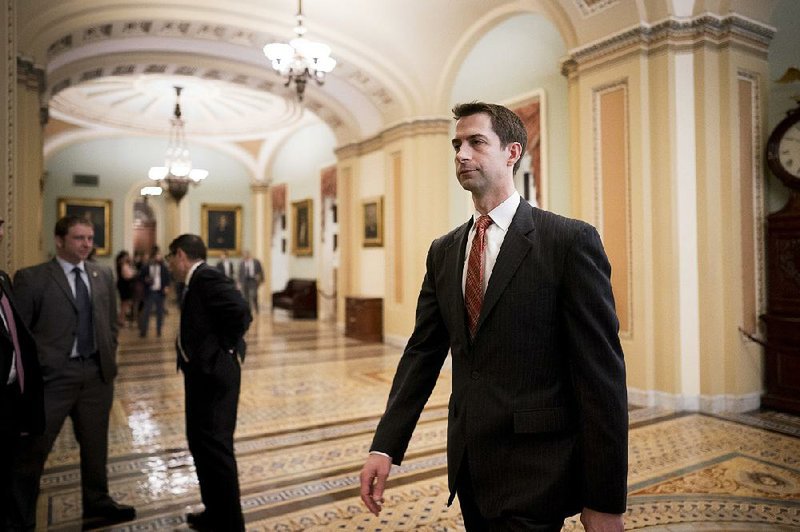WASHINGTON -- A historic arms-reduction treaty should be abandoned so the nation can properly defend itself against China and Russia, U.S. Sen. Tom Cotton, R-Ark., said Wednesday.
Once it withdraws from the 1987 Intermediate-Range Nuclear Forces (INF) Treaty, the United States must begin deploying conventional ground-based medium-range missiles around Asia as a check on Chinese military might, he added.
The U.S. is currently "outranged and outgunned," Cotton told a Heritage Foundation audience, echoing the words of retired Gen. H.R. McMaster and others.
"We have no ground-based capability that can threaten China. If the conventional military balance continues to shift against us in the Indo-Pacific, the United States may find itself unable to credibly uphold its military commitments in the region. That's why it's imperative that we seize the opportunity provided by our imminent withdrawal from the INF and regain the upper hand over our rivals," Cotton added.
Withdrawal from the treaty gives the U.S. the opportunity to strengthen its hand, Cotton said.
Secretary of State Mike Pompeo announced last month that the U.S. would suspend its commitments under the two-nation treaty, citing violations by Russia.
Officials in Moscow maintain they've abided by the agreement, which prohibits the two nations from deploying ground-based missiles with a range between about 310 and 3,400 miles.
The treaty bars nuclear as well as conventional missiles.
The agreement, hammered out between U.S. President Ronald Reagan and Soviet leader Mikhail Gorbachev, helped contribute to the end of the Cold War.
At the time, the United States and the Soviet Union were the world's only two military and economic superpowers. As the only signatories to the treaty, they are the only countries prohibited from testing, possessing or deploying the weapons.
If the treaty is officially terminated in August, as expected, the Pentagon plans to test two types of medium-range missiles later this year, the Associated Press reported Wednesday.
The move could backfire, according to James McKeon, an analyst with the Center for Arms Control and Non-Proliferation.
"We're risking an arms race, a rehashing of the worst moments of the Cold War, by getting rid of this treaty," he said in an interview.
In his remarks, Cotton suggested the INF Treaty is obsolete.
"Today, much as we might still focus on Europe, there's a gathering threat in the Far East and the conventional balance of power is tilting slowly away from the United States. For too long, our government stood paralyzed while American power eroded," he said. "But in just a few months, that all stops. We'll have the opportunity to seize the strategic initiative once again."
Cotton, who now classifies China as a global superpower, argued that the status quo cannot continue.
"Beijing has stockpiled thousands of missiles that can target our allies, our bases, our ships and our citizens throughout the Pacific, yet we don't have the weapons to match either threat because for 10 years we've been the only nation on Earth that has constrained itself from producing medium-range land-based missiles," the lawmaker from Dardanelle said.
Cotton suggested deploying the new class of conventional missiles initially in Guam, a U.S. territory in the Western Pacific.
On Wednesday, Guam's delegate to Congress said he would "absolutely" support such a move.
"They already have their missiles pointed at us," , Michael San Nicolas said. "Let's point ours right back at them, and let's include a robust missile defense system as well to protect these assets and the people of Guam."
China has put into service a missile capable of striking a key U.S. naval base located in Guam. The Chinese media have dubbed the missile the "Guam Killer," according to Reuters.
Eventually, the U.S. would need to place its conventional missiles elsewhere in the region, Cotton said.
"We will also need to consult our allies about deploying medium-range missiles under their territory as part of a serious plan to counter China," he said. "Such deployments, though controversial to some, have great potential to enhance our network of allies and partners in the region."
Lori Esposito Murray, an adjunct senior fellow at the Council on Foreign Relations, says Moscow's actions have undermined the treaty.
"The Russians have been violating the INF agreement for a number of years, first with the testing and development, and now the deployment, of these intermediate-range, ground-based systems. These actions are violations of the treaty, and unless they are reversed make the treaty unviable. President [Donald] Trump withdrew from the INF treaty with the support of our NATO allies," she said in an email.
But she hopes the treaty can be salvaged.
"The most important issue at this point is whether the U.S. will decide to follow Russia's lead into a destabilizing arms race or whether the U.S. will decide to also assert its long-standing leadership on nuclear arms control to bring the Russians back from the brink of a new, intensive, and destabilizing round of competition -- one that would undermine the historic progress on nuclear reductions and stability. The nuclear arms control regime stands at a crossroad," she wrote.
McKeon, the Center for Arms Control analyst, accused Cotton of "inviting an arms race."
It's a risky strategy, given existing geopolitical realities, he said.
"Instead of Ronald Reagan and Mikhail Gorbachev, we have Donald Trump and Vladimir Putin. We got very lucky with how things worked out in the '70s and '80s. I don't have the confidence in our leaders to recreate what happened during the Cold War," he said.
"I think the prospects of actually destabilizing the situation, increasing the chances that we would get into a place where none of us want to find ourselves, makes the INF withdrawal so dangerous."
A Section on 03/14/2019
